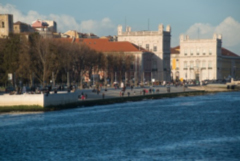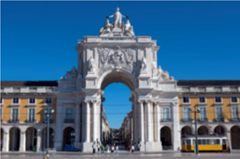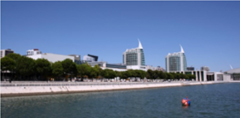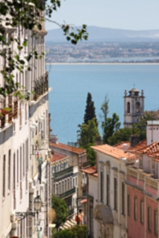About Lisbon and Travel information
About Lisbon
Lisbon's location, spread over seven low hills, overlooking the river Tejo, once lured traders and settlers, continues to be a stunning site. Add to that the cultural diversity, a pleasantly temperate climate all year-round and a people that by longstanding tradition offer visitors a warm welcome. Medieval Alfama is the charming and oldest part of the city with its maze-like streets, crowned by the impressive Castelo de São Jorge. The Baixa's commercial avenues lies just below. The elegant Chiado shopping area climbs away up another hill, next to Bairro Alto, home of much of the Lisbon nightlife.
The westernmost part of the city, Belém, was the birthplace of the Age of Discoveries and Parque das Nações (the 98 World Expo site) in the eastern side of the city is an area full of 21st century avant-garde architecture built on a most impressive river side site.

A very brief history…
Lisbon dates back to pre-Roman times - legend has it that Ulysses founded the city, although it was more probably the Phoenicians. In its early years Lisbon was a constant battleground with Phoenicians, Greeks and Carthaginians taking turn to rule the city.
In 714 the powerful Moors arrived and, by fortifying the city, held out against Christian attacks for over 400 years. By 1147 the Moors' luck turned and the Christian Cruzaders recaptured Lisbon. The 16th century was Portugal's short-lived golden era of sea exploration when riches were brought from across the oceans.
In the late 17th century the discovery of gold in Brazil saw Lisbon enjoy another luxurious period but this time it was cut short by the massive earthquake in 1755 which reduced the city to rubble. In 1910 the monarchy fell and the first Portuguese Republic was proclaimed. Portugal's democratic phase lasted until 1926, when a military coup reduced Portugal to a period of totalitarian regime under the dictator Antonio Salazar.
The costly colonial wars in 60`s and 70`s within African Portuguese territories, led to the "Carnation Revolution", a nearly bloodless military coup on 25 April 1974. The new government instituted democratic reforms and granted independence to the African colonies in 1975. In 1986 Portugal became a full member of the European Union.

Not to miss in Lisbon



Baixa (downtown) - the busiest financial and shopping area. Praça do Comércio, the magnificent «Black Horse» Square with its Triumphal Arch facing the River Tagus, the Cathedral, the City Hall, the Carmo Convent, etc.
Alfama - charming ancient Moorish quarter with narrow winding streets and picturesque white washed houses, crowned by St. Jorge's Castle.
Bairro Alto - a typical "quarter" in the city centre where the nightlife is lively and where you will find some of the more famous Fado houses, where Fado (the traditional "blues" of Lisbon) is performed.
Belém - the westernmost part of the city, known by its monuments (Tower of Belém, Jerónimos Monastery, Discovery's Monument, Cultural Centre, Royal Coaches Museum, Ajuda Royal Palace, and the Presidential Palace), also for its leisure and recreational areas. It was from Belém river shore that the ships of Vasco da Gama and other famous explorers set sail, near its graceful Tower (1515) and Jerónimos Monastery, two of the finest examples of the Manueline style.
Parque das Nações (Nations Park) - the site of the Expo'98, with new spectacular sights of Lisbon : the Vasco da Gama Tower, the old oil refinery Galp Tower, the Pavilhão de Portugal (designed by the rewarded Portuguese architect Siza Vieira), the Oceanarium, and the superb "Atlantico Dome" - Lisbon's multipurpose hall for sports, shows, meetings and exhibitions.
Mini Cruise Tagus River - A mini cruise is a real must in order to enjoy Lisbon, a city overlooking the river and the ocean. Centuries of history will emerge from its monuments scattered along the hills.


Useful information
Accessibility
Lisbon International Airport (Portela) is served by daily direct flights operated by most of the traditional air lines as well as by many of the low cost companies operating in Europe. The Lisbon airport is located in the town itself, about 15 minutes transfer to the official hotels and even shorter to the Conference Venue.
Climate
The average maximum daily temperature and average minimum temperature in the Lisbon area in September are 24 C / 64 F (high) and 17 C / 52 F (low). Please take in consideration that Lisbon is located by the river and the ocean, and therefore can be windy in the late afternoon or evening. A sweater or a ladies pashmina may be necessary.
Currency
Portugal is a member of the European Monetary System, and the previous currency Escudo was replaced by the €uro on 1 January 2002.
Electric Current
Portuguese standard is the European type 2 pin sockets with 220 volts AC at 50 cycles.
Health Requirements
With the exception of vaccination certificates for persons coming from areas where yellow fever is endemic, at the present there are no special health requirements.
Medical Care
Clinics and hospitals provide 24 hrs emergency service. The national emergency phone number is 112. Hotels have a doctor on call through the reception. Reciprocal E.C. cover is available at out-patient departments, otherwise private consultation fees are charged.
Hotel Check in/out Policy
Normal check in time at hotels is 15h00. The established check out time is 12h00. Should you need guaranteed occupancy before 13h00 on the day of your arrival, the previous night should be reserved.
TAX Free
Sales tax (VAT) is included in prices quoted. For non E.U. residents, tax free shopping schemes are available in many shops, which give substantial savings to visitors.
Smoking
The Portuguese law, in accordance with Regulations in force in the majority of European Countries and the USA, does not allow smoking in any public transportation or in any closed public areas. (Some restaurants, bars and discotheques may have a designated smoking area).
Local Time
Mainland Portugal is 1 hour ahead of European Standard Time (C.E.T. + 1).
Language
The official language is Portuguese although English and French are widely spoken.
Shopping and entertainment
Shopping
Shopping in Lisbon is really worthwhile. In addition to the many international brand boutiques, megastores and designer shops, you will also dins best quality domestic leather articles such as bags, belts and shoes, some of them handmade. You can also pick-up Portuguese hand-painted tiles ("azulejos") and crystal glass articles at most reasonable prices. Fine leather goods, lead crystal ware, porcelain, vintage wines, golden and silver filigree, pottery and specialist textiles are considered excellent buys in Portugal. The pedestrian streets of the city centre, "a Baixa", bordered by the magnificent Praça do Comércio, facing the River Tejo, and the "Chiado" area leading to Bairro Alto, are popular shopping areas. Shops are open from 09h00 to 13h00 and 15h00 to 19h00 Monday to Friday, and 09h00 to 13h00 on Saturdays. Major shopping malls stay open from 10h00 to 23h00, including weekends. The main shopping centres are Colombo, Amoreiras, Vasco da Gama and the Atrium Saldanha, all within easy access by underground network (metro).
Entertainment
Lisbon has a variety of theatres and venues catering for most tastes. Opera, ballet, concerts, etc. take place on a regular basis all year round. There are a wide variety of restaurants and cafes in Lisbon ranging from the very elegant and sophisticated to the casual and inexpensive. Restaurants, bars, some with live music/shows, and discos along the river Tagus, the Docas area and at the Nations Park, are very popular, especially during weekends. Excellent golf courses, water sports and horse riding tempt the energetic delegates. The more relaxed might choose from many noteworthy museums and monuments, sunny beaches and interesting sites to explore.
